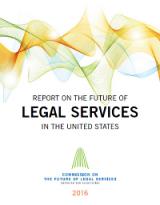ABA Commission on the Future of Legal Services Recommends Sweeping Changes in Delivery of Legal Services
The American Bar Association Commission on Future of Legal Services has released its final report & recommendations. The report found that the American public faces significant, unmet legal needs that require considerably more innovation and other efforts to bolster access to affordable legal services.
The commission, releasing findings from a two-year study, offered 10 recommendations to build on past national efforts and to ensure that everyone has meaningful assistance for essential legal means. The recommendations call for sweeping changes to both the civil and criminal systems of justice.
One recommendation, urging state courts to adopt model regulatory objectives for the delivery of legal services, was approved as ABA policy by the House of Delegates in February. Other recommendations have been debated but not embraced by the Association, such as alternative business structures (ABS) for U.S. law firms. As part of a broader recommendation, the commission said future “exploration” of ABS would be “useful.”
The commission’s 10 recommendations, all accompanied by sub-recommendations and supporting materials, are:
- The legal profession should support the goal of providing some form of effective assistance for essential civil legal needs to all persons otherwise unable to afford a lawyer.
- Courts should consider regulatory innovations in the area of legal services delivery.
- All members of the legal profession should keep abreast of relevant technologies.
- Individuals should have regular legal checkups, and the ABA should create guidelines for lawyers, bar associations and others who develop and administer such checkups.
- Courts should be accessible, user-centric, and welcoming to all litigants, while ensuring fairness, impartiality and due process.
- The ABA should establish a Center for Innovation.
- The legal profession should partner with other disciplines and the public for insights about innovating the delivery of legal services.
- The legal profession should adopt methods, policies, standards, and practices to best advance diversity and inclusion.
- The criminal justice system should be reformed.
- Resources should be vastly expanded to support long-standing efforts that have proven successful in addressing the public’s unmet needs for legal services.
The Commission’s Findings
The Commission based these Recommendations on several key findings. On the issue of access to justice the Commission specifically found:
Despite sustained efforts to expand the public’s access to legal services, significant unmet needs persist.
- Most people living in poverty, and the majority of moderate-income individuals, do not receive the legal help they need.
- Funding of the Legal Services Corporation and other legal aid providers remains insufficient and will continue to be inadequate in the future.
- Pro bono alone cannot provide the poor with adequate legal services to address their unmet legal needs.
- Efforts targeting legal assistance for moderate-income individuals have not satisfied the need.
- Funding of the Legal Services Corporation and other legal aid providers remains insufficient and will continue to be inadequate in the future.
- The public often does not obtain effective assistance with legal problems, either because of insufficient financial resources or a lack of knowledge about when legal problems exist that require resolution through legal representation.
- The vast number of unrepresented parties in court adversely impacts all litigants, including those who have representation.
- Many lawyers, especially recent law graduates, are unemployed or underemployed despite the significant unmet need for legal services.
- The traditional law practice business model constrains innovations that would provide greater access to, and enhance the delivery of, legal services.
- The legal profession’s resistance to change hinders additional innovations.
- Limited data has impeded efforts to identify and assess the most effective innovations in legal services delivery.
Other findings of the Commission included:
- Advancements in technology and other innovations continue to change how legal services can be accessed and delivered; and
- Public trust and confidence in obtaining justice and in accessing legal services is compromised by bias, discrimination, complexity, and lack of resources.
The full report of the Commission can be viewed here.
Some video hightlights from the Commission can be viewed below:
